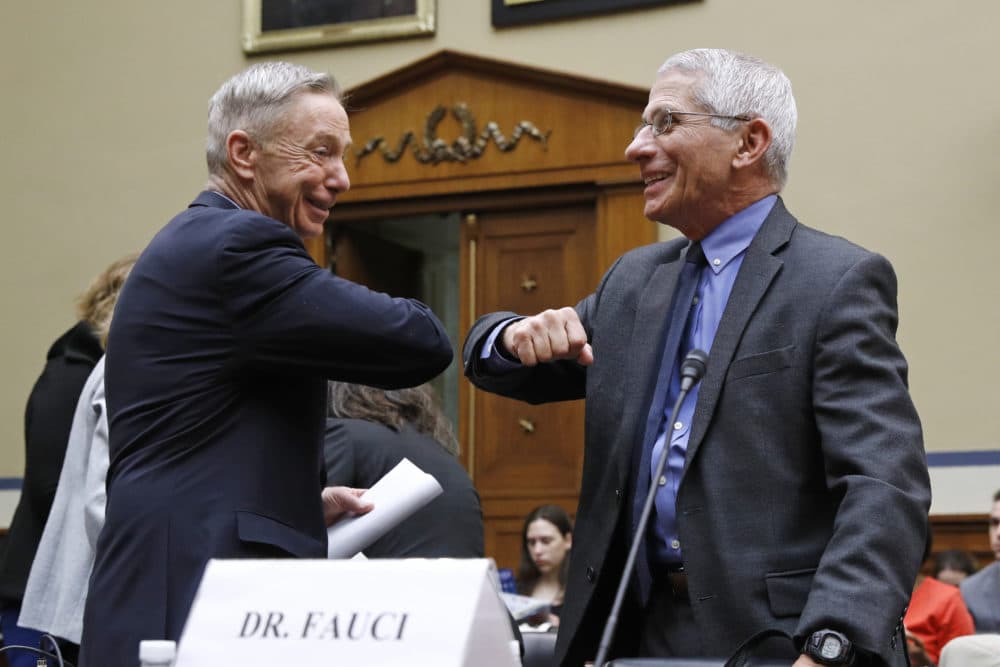Advertisement
Coronavirus Coverage
More Shutdowns Are Avoidable, But The Public Needs To Trust Science, Dr. Fauci Says At Harvard

After thousands became infected with the coronavirus last spring, hard hit states like Massachusetts had to impose months of restrictions to bring the pandemic to heel. As communities ease back into something resembling normal life, National Institute of Allergy and Infectious Diseases chief Dr. Anthony Fauci says complete shutdowns should not be necessary in the future.
“We can continue to go toward normality without doing the drastic things of shutting down if we follow some fundamental principles,” he said during a virtual symposium hosted by Harvard University’s T.H. Chan School of Public Health on Wednesday. “You know what you got to do: You’ve got to wear a mask. You’ve got to avoid crowds. Outdoors is better than indoors. All the same stuff.”
Those basic COVID-19 precautions have become a mantra in public health messaging of late, with Fauci and other health experts repeating them in every public appearance. But during the symposium, Fauci said these basic precautions have become complicated through the politicization of public health and science.
“There are some people that just don’t believe me or don’t pay attention to that. And that’s unfortunate because that is the way out of this,” Fauci said. “There’s such a divergence of how people view this... Whether you wear a mask [depends] on how you feel politically, which is completely ridiculous because a mask is a public health tool.”
Public mistrust in science may have to do with a misunderstanding of scientists and researchers, Fauci suggested. To combat that, Fauci thinks scientists need to be more transparent about their work and how it can benefit the public.
“It’s almost related to a mistrust of authority that spills over,” he said. “Scientists, because they’re trying to present data, may be looked upon as being an authoritative figure. The pushing back on government is the same as pushing back on scientists.”
Fauci said that objections to his work as a health expert and as a scientist have been so virulent in recent months that he needed to get security to protect the safety of himself and his family.
"I wouldn’t have imagined in my wildest dreams that people who object to things that are pure public health principles and don’t like what you and I say, that they actually threaten you,” he said. “You know, getting death threats for me and my family and harassing my daughters.”
Helping the public “understand why science and evidence-based policy is so important” is key to getting people to follow COVID-19 precautions that can help save lives, Fauci said. Everyone in the world will need to work together in order to end the pandemic.
“As long as you have any member of society, any demographic group, who’s not seriously trying to get to the end game of suppressing this, it will continue to smolder and smolder,” he said.
The notion that returning to a stay-at-home state is avoidable to manage the pandemic is one that other health experts share as well. Mariana Matus, the co-founder of the wastewater epidemiology company Biobot Analytics, said the use of technology can improve communities’ odds of controlling the coronavirus by providing a heads up when spikes in new cases might be coming.
Her company provides one stream of data for that early warning. Rapid, widespread testing, social media data, and contact tracing investigating new infections also provide information that can help officials stay vigilant against new coronavirus outbreaks. As reported earlier on WBUR, Massachusetts is employing some of these techniques. For example, the state water resource authority works with Biobot to monitor wastewater for coronavirus.
In recent weeks, the positive test rate in Massachusetts has creeped up slightly. Gov. Charlie Baker has said that if the trend continues, the state may have to slow the reopening process.
“Top notch science, technology and data analytics [help] solve problems that affect us all,” Matus said. “It can make public health more data driven, more equitable and more preventative. We don’t need to be going through lockdowns like what we’re experiencing now. Technologies can help us stay ahead of it.”
And trust in science can help us prevent the next pandemic, too, Fauci said.
“We will have another pandemic for absolutely certain,” he said. “I’m asking — we’re going to do it — to develop a universal coronavirus vaccine against all coronaviruses. Shame on us if we’re not prepared for the next coronavirus pandemic outbreak.”
